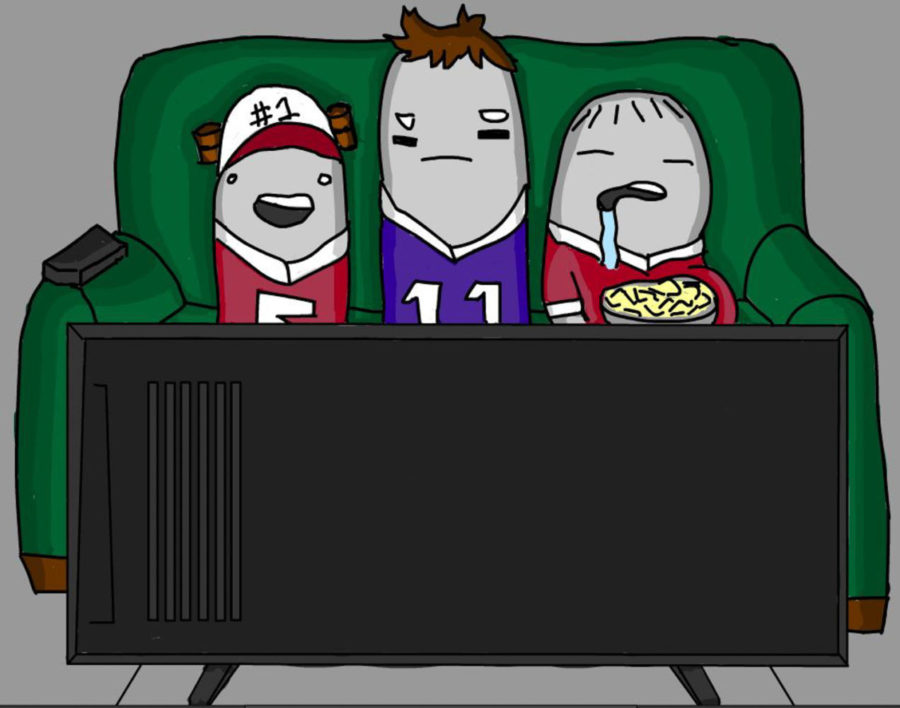Whether it was my mother or father taking me to a ball game, or everyone in Catholic grade school sporting Steelers jerseys on Fridays before pivotal games — sports have been ingrained in me since the start.
Like most decisions made at a young age, my sports-rooting interests were predetermined by where I was born — right here in Pittsburgh. My family’s favorite teams — the Steelers, Penguins, Pirates and unfortunately right now, the Panthers — were automatically my favorites.
Sports are some of the most vivid memories of my early years. Before I could walk, there was either a baseball glove on my hand or a hockey stick twice my size within arm’s reach. These not-so-subtle hints from those around me toward athletics thrust me into the world of sports.
Similar to reality television and “Game of Thrones,” there is something special about sporting events that enthralls contemporary audiences to the point of unhealthy obsession. Viewership stems from lineage — a social network — and becoming a witness to sports chronicles.
I’m not the only one who has experienced this phenomenon of being a fan.
A 2015 Gallup poll found that 59 percent of Americans claim to be sports fans, only a 1 percent drop since 2000. A majority of us enjoy sports and consider them an important part of our lives — a trend that isn’t going out of style any time soon. Sports fans find connections with franchises, teams, players and other fans — and these connections last.
As a fan, my feelings during an event act as emotional capital, used to gamble on the performances of men and women who don’t even know I exist. I sell my soul to a team and in return receive either massive amounts of joy or sadness. It is an unusual relationship, but one that makes for incredible theater.
Sports are inherently entertaining. There is always a winner and a loser, and no game is played exactly the same. Players and coaches come and go, fan bases shift and sometimes entire teams pick up and move cities. Still, the dedication fans have is steadfast. Sports end friendships and spark relationships.
And when a new season begins, it’s a fresh start to everything and anything could happen. Everything is fair game, even the parts of sports that aren’t so positive.
Feuds like “the malice at the palace” — which featured multiple players from the Detroit Pistons and Indiana Pacers exchanging punches with each other and spectators — had viewers’ jaws on the floor.
Despite often being littered with violence and bad blood, there are moments in sports that bring viewers together. Recognizing athletes as human beings is helpful in cushioning the blow.
Pitt fans may recall the emotion they felt following James Conner’s cancer diagnosis in 2015. Conner fought through chemotherapy and worked hard during practice to return to full health. He had to recondition his body for the brutal running back position, which included running drills with a surgical mask over his mouth. His return to action was a victory beyond the realm of just sports.
If you’ve kept up with Conner, you know his story has far from halted. Conner fulfilled his dream of making it to the NFL, drafted by the team he shared a home field with his entire collegiate career, the Pittsburgh Steelers.
These historic events are one of a kind, though, because any fan can witness them in real time. A viewer can sit down in their living room and watch legends be made — from Dock Ellis throwing a no-hitter high on LSD in 1970, to the Cleveland Indians winning 22 games in a row this season.
Sports allow the audience to become a part of history. Even though viewers have no effect on the outcome, being able to say they were witnesses to what transpired is treasured.
Even if you aren’t born into liking sports, you can still join in on the fun and camaraderie of being a fan. A cheap Student Rush ticket to a Penguins game could turn into a lifelong obsession, or dating a die-hard Steelers fan could make you one too.
Sports are social, they’re familial, they give us conversation starters and lively dinner table arguments. It doesn’t matter if fans are sitting in the third row or stuck in traffic listening on the radio, we’re part of a bigger picture.


